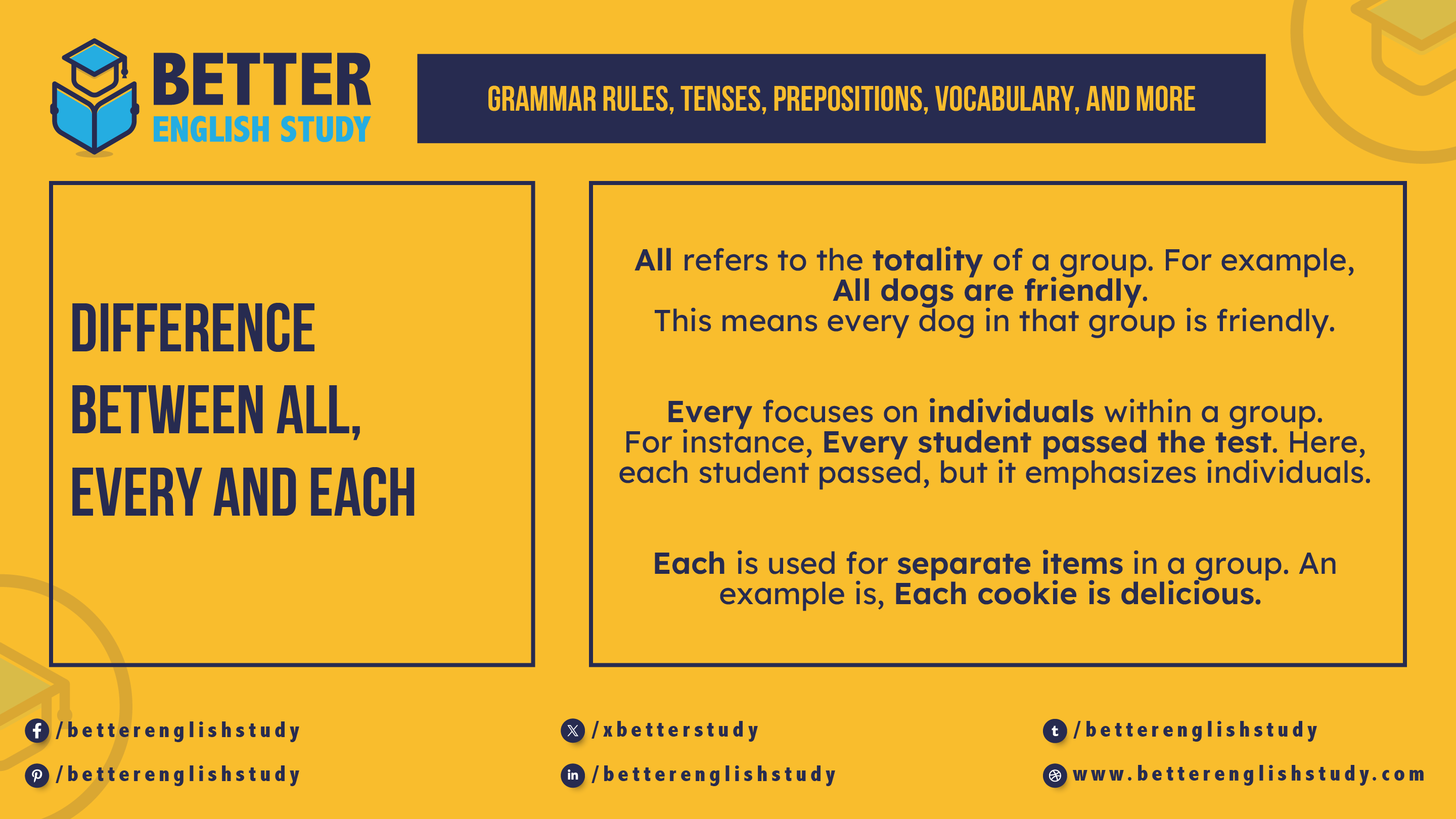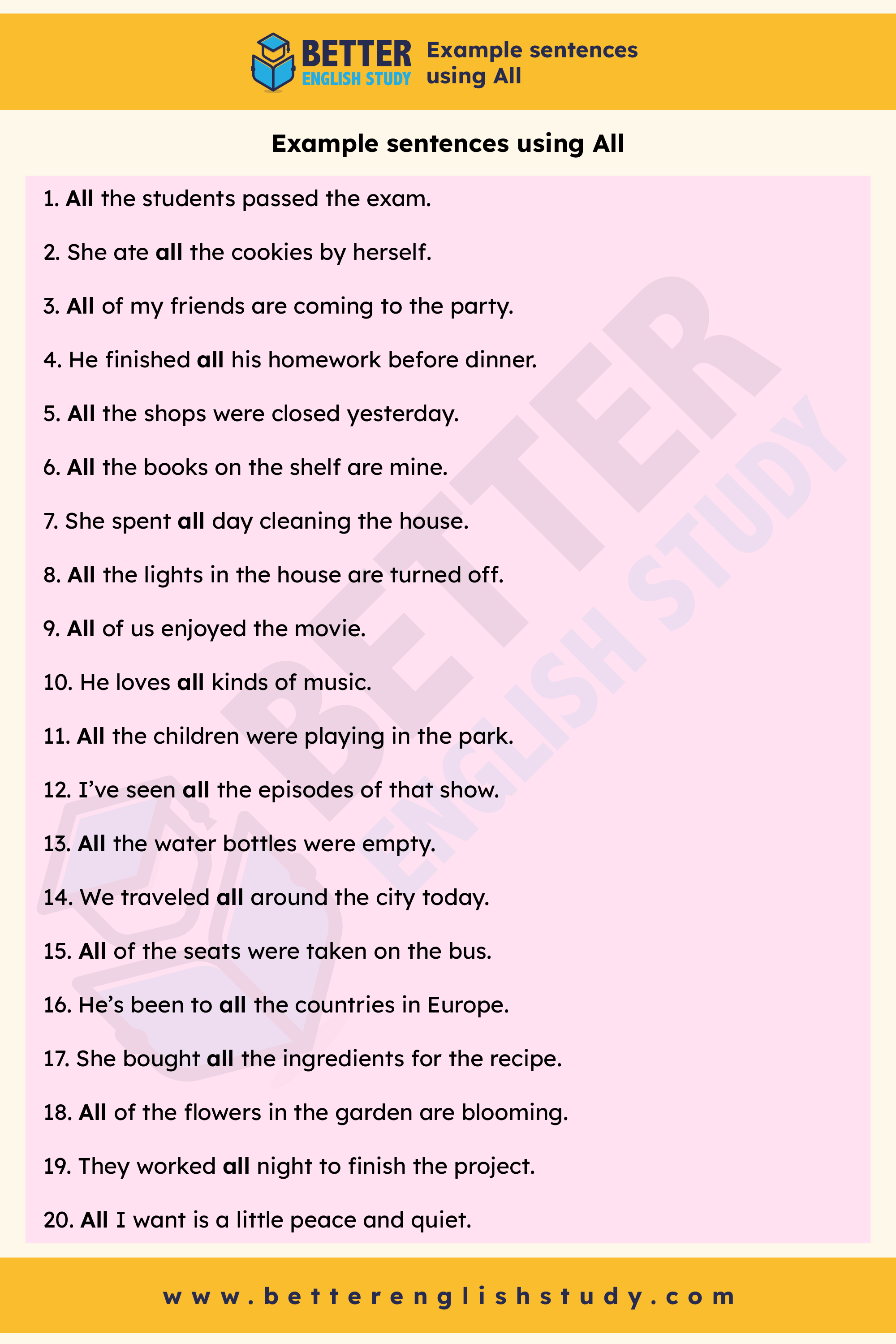
“All” refers to the totality of a group, “every” emphasizes each member in a group, while “each” focuses on individual items. For example, “All students passed the exam,” “Every student must submit homework,” and “Each student received a certificate.”
Understanding the nuances between “all,” “every,” and “each” can enhance your communication skills. These words may seem interchangeable, but they serve distinct purposes in sentences.
Introduction To Quantifiers In English
Understanding quantifiers is essential in English. The words “all,” “every,” and “each” help express quantity. They may seem similar but have different uses.
“All” refers to the totality of a group. For example, “All dogs are friendly.” This means every dog in that group is friendly.
“Every” focuses on individuals within a group. For instance, “Every student passed the test.” Here, each student passed, but it emphasizes individuals.
“Each” is used for separate items in a group. An example is, “Each cookie is delicious.” This highlights that every cookie is enjoyable on its own.
Common misconceptions include using these words interchangeably. Remember that “all” is collective, while “every” and “each” are more specific.
The Meaning And Usage Of ‘all’
The word “all” refers to the whole quantity or group. It means every single item in a collection. For example, “All the apples are red.” This shows that every apple shares the same color.
Another example is, “All students must attend the meeting.” Here, it indicates that every student is included.
Using “all” is common in daily conversations. It helps emphasize totality in a simple way.
| Sentence | Meaning |
|---|---|
| All dogs bark. | Every dog makes a barking sound. |
| All cars need fuel. | Every car requires fuel to run. |
20 example sentences using All
- All the students passed the exam.
- She ate all the cookies by herself.
- All of my friends are coming to the party.
- He finished all his homework before dinner.
- All the shops were closed yesterday.
- All the books on the shelf are mine.
- She spent all day cleaning the house.
- All the lights in the house are turned off.
- All of us enjoyed the movie.
- He loves all kinds of music.
- All the children were playing in the park.
- I’ve seen all the episodes of that show.
- All the water bottles were empty.
- We traveled all around the city today.
- All of the seats were taken on the bus.
- He’s been to all the countries in Europe.
- She bought all the ingredients for the recipe.
- All of the flowers in the garden are blooming.
- They worked all night to finish the project.
- All I want is a little peace and quiet.

The Specifics Of ‘every’
The word every means all individuals in a group. It suggests a total inclusion. For example, “Every student passed the exam” means all students succeeded.
Another example is, “Every car must stop at the red light.” This shows that each car has to follow the rules.
In sentences, every emphasizes the complete set. It tells us nothing is left out. It is important for clarity in communication.
20 example sentences using Every
- Every student needs to bring a pencil.
- She goes to the gym every morning.
- Every book on the shelf is a classic.
- We visit our grandparents every summer.
- Every time I see him, he has a new story.
- Every day, I drink a cup of coffee.
- Every teacher at the school is very kind.
- He reads every newspaper in the morning.
- Every child in the class has a different talent.
- Every movie I watch seems to be better than the last.
- She calls her mother every week.
- Every car in the parking lot was blue.
- They have a meeting every Friday.
- Every cookie in the jar was eaten.
- Every song on the album is a hit.
- Every plant in the garden is thriving.
- He tries to learn every day.
- Every room in the house needs to be painted.
- We go to the same restaurant every Saturday.
- Every question on the test was easy for her.
Understanding ‘each’ In Context
Each refers to every individual item in a group. It emphasizes singularity rather than the group as a whole. For example, in the phrase “Each student received a book,” it highlights that every student got their own book.
Another example is, “Each cake was decorated differently.” This shows that every cake had a unique design.
Using “each” makes it clear that the focus is on individual items. It suggests careful attention to every single element.
In questions, it can appear as “Did each child enjoy the game?” Here, it asks about every child’s experience.
20 example sentences using Each
- Each student received a gift.
- I bought each of my friends a birthday present.
- Each room in the house has a different color.
- They visited each museum in the city.
- Each book on the shelf is a bestseller.
- She takes each class very seriously.
- Each child was given a piece of candy.
- They work on each project together.
- Each dog at the park was friendly.
- We need to review each chapter before the test.
- Each member of the team contributed to the project.
- He writes each letter with care.
- Each house on the street looks different.
- She watered each plant in the garden.
- Each answer on the quiz is worth ten points.
- They checked each item on the list.
- Each day brings a new opportunity.
- The teacher asked each student a question.
- Each recipe requires a different ingredient.
- They decorated each room for the holiday.
Comparative Analysis
All refers to the total group. Use it for collective references. For example, “All students passed the test.” It emphasizes the whole, not individual parts.
Every means each one in a group. Use it when talking about individuals. For instance, “Every student has a unique talent.” It highlights individuality.
Each focuses on one item at a time. Use it for specific items or people. For example, “Each student received a certificate.” It shows attention to detail.
| Word | Usage | Example |
|---|---|---|
| All | Total group | All the cookies are gone. |
| Every | Each one | Every cookie is delicious. |
| Each | Individually | Each cookie has a different flavor. |
Common Errors And How To Avoid Them
Common mistakes can happen with the word all. People often use it incorrectly. For example, saying “all of the students passed” is fine, but “all students passed” is also correct. Be careful not to overuse it.
Misusing every is another issue. Many think “every” means a group. Instead, it refers to individuals in a group. Saying “every student passed” focuses on each one. Avoid saying “every of the students” as it is incorrect.
Errors with each also occur. Each refers to individual items or people. For instance, “each student received a prize” is correct. Do not say “each of students received a prize.” This is incorrect usage.
Practical Exercises And Quizzes
Test your understanding of “All”, “Every”, and “Each” with these exercises.
- All students passed the exam.
- Every student submitted their homework on time.
- Each participant received a prize.
Answer Key:
| Sentence | Correct Usage | Explanation |
|---|---|---|
| All students passed the exam. | All | Refers to the entire group of students. |
| Every student submitted their homework. | Every | Focuses on each individual student. |
| Each participant received a prize. | Each | Highlights individual recognition for participants. |
Frequently Asked Questions
What Is The Difference Between “all,” “every,” And “each”?
“All” refers to a collective group, emphasizing the totality. “Every” focuses on individual items within a group, highlighting inclusiveness. “Each” emphasizes individuality, often used when discussing items separately. Understanding these distinctions can enhance your communication clarity.
When Should I Use “all” In A Sentence?
Use “all” when discussing a complete set or group. For example, “All students passed the exam” indicates that every student in that group succeeded. It’s particularly effective when you want to convey inclusiveness or totality in your statement.
Can I Use “each” For Collective Groups?
No, “each” is meant for individual items, not groups. It’s best used when you want to focus on single elements in a set. For instance, “Each student received a grade” emphasizes the individual attention given to every student.
Is “every” Interchangeable With “all”?
Not exactly. While “every” and “all” can sometimes overlap, they have distinct uses. “Every” highlights individual members, while “all” encompasses the entire group. Understanding the context will help you choose the appropriate term for your sentence.
Conclusion
Understanding the differences between “all,” “every,” and “each” can enhance your communication skills. Each word serves a unique purpose in sentences. By using them correctly, you’ll express ideas more clearly. Practice using these terms in various contexts to master their nuances.
This will improve both your writing and speaking abilities.
